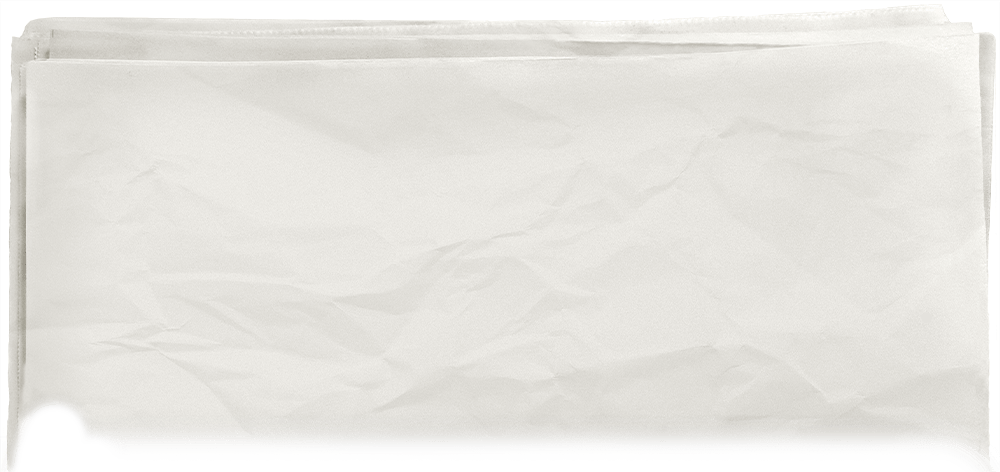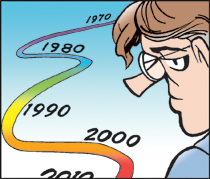Timeline


Timeline
An illustrated chronology of impact
For over forty years Doonesbury has had an uninterrupted history of inspiring controversy and generating fallout. It has consistently helped steer the national conversation - by commenting on it, provoking it, and sometimes being the subject of it. From cancelled papers and angry commentary to military commendations and the Pulitzer Prize, "Timeline" chronicles the real-life adventures of a strip that can't stay out of the news.
1970
-
September 30, 1968
Bull Tales, by G.B. Trudeau, first appears in the Yale Daily News. Within a few weeks it attracts the attention of Universal Press Syndicate co-founder and editor Jim Andrews.
-
October 26, 1970
Renamed after its principal character, Doonesbury debuts in 28 newspapers.
-
July 17, 1971
Doonesbury escapes cancellation in a Macon Telegraph referendum. For Doonesbury, 27; against, 22. It is the first of many such polls taken around the country.
-
August 17, 1971
Trudeau's father compliments him on his strip's initial success: "You're lucky you were born when you were. In my day you'd have been a loser."
-
September 15, 1971
Trudeau introduces cheerleader Boopsie. "Sometimes he'll send me a pencil sketch with a girl without any clothes on," editor Jim Andrews tells Glamour. "He does it to see if I notice."
-
January 10, 1972
Rev. Scot Sloan enters the strip, primarily based on Trudeau's roommate William "Scotty" McLennan. "I simply appropriated him, ordaining him on the spot (so as to fulfill one of his personal goals before he could)," Trudeau later wrote.
-
November 12, 1972
Zonker tells one of his daycare charges a fairytale that features Douglas, a gentle freak who was given his weight in "fine, uncut Turkish hashish." A firestorm of protest results.
-
April 1, 1973
The Oregonian drops the strip, and receives a barrage of protest phone calls organized by "Phrends of Phred."
-
May 10, 1973
Unanticipated resignation of Watergate conspirator John Ehrlichman causes GBT to withdraw a week of strips. Ehrlichman writes Trudeau, "I hear my resignation fouled upyour series. Sorry. Next time, let me know what you are planning and I'll try to cooperate."
-
May 29, 1973
More than a dozen papers drop a strip in which Mark condemns Watergate conspirator John Mitchell. The Washington Post tells its readers, "If anyone is going to find any defendant guilty, it's going to be the due process of justice, not a comic strip artist."
-
June 4, 1973
Stars and Stripes drops Doonesbury as "too political." After the paper receives nearly 300 letters of protest, mostly from enlisted men and their families, the strip is reinstated.
-
September 17, 1973
The Lincoln Journal becomes the first of many papers to move Doonesbury from the comic page to the editorial page.
-
February 4, 1974
A Doonesbury series dubs Energy Secretary William Simon "the Energy Czar." Doonesbury-reading colleagues take to addressing a pleased Simon as "your Czarship."
-
February 27, 1974
The Boston Globe notes in an editorial that the end of the energy crisis, recently disclosed by President Nixon, had in fact already been announced two weeks earlier in Doonesbury.
-
May 31, 1974
Joanie Caucus is accepted into law school -- at Boston University, Georgetown, Golden Gate State, and U.C. Berkeley. She chooses Berkeley. Trudeau receives so much mail addressed to Caucus that his mailman thinks he's living with her.
-
June 1, 1974
"Mike Doonesbury" is featured as the correct answer in a Burger King scratch-off trivia game.
-
August 2, 1974
The San Francisco Chronicle drops Doonesbury for one day, receives 2,000 phone calls from irate readers. Berkeley law students hold press conference to announce they will picket -- and eventually sue -- if the strip is not re-instated.
-
May 5, 1975
Trudeau becomes the first comic strip artist to win the Pulitzer Prize for Editorial Cartooning. The Editorial Cartoonists' Society passes a resolution condemning the Pulitzer Prize committee. Trudeau, assured the award is irrevocable, supports the resolution.
-
June 12, 1975
An exhibition of Doonesbury cartoons opens in Washington, D.C., for the benefit of the National Women's Political Caucus. Sniff's the Washington Post's critic, "There is no way to defend his art as Art."
-
December 1, 1975
GBT travels with the press corps covering Gerald Ford's visit to China, and becomes the first American cartoonist to toss a Frisbee on the Great Wall.
-
January 19, 1976
Uncle Duke calls President Ford's son a "pot head." Seven papers drop the strip.
-
February 9, 1976
Doonesbury makes the cover of Time. "The essential message may be that inside even the most formidable public figures and most vituperative public debates there are hard kernels of decency — and lunacy."
-
February 10, 1976
Andy Lippincott, the first gay Doonesbury character, is introduced. Dozens of newspapers drop the sequence. Some papers offer to mail copies of the offending strips to readers.
-
March 22, 1976
In a nationwide poll, high school seniors select Trudeau as the tenth most admired world figure, just behind Alexander Solzhenitsyn and Ralph Nader, just ahead of Ronald Reagan and Pope Paul.
-
June 30, 1976
Doonesbury looks at the Washington sex scandals. The sequence, called "vulgar" by one newspaper, is dropped by a dozen others.
-
November 13, 1976
Over 30 newspapers drop a strip showing Joanie and Rick in bed together (at the time neither was married). M.I.T. students picket the Boston Globe with signs reading "Joanie, we forgive you."
-
May 21, 1977
Joanie Caucus graduates from law school. Trudeau delivers the commencement address.
-
June 20, 1977
Duke is replaced as Ambassador to China. GBT is subsequently commissioned to paint a portrait of the former Ambassador for the U.S. Embassy in Peking.
-
August 29, 1977
The New York Daily News refuses to publish the "Son of Sam" series that ridicules the paper for its sensationalist coverage of the mass murderer.
-
November 27, 1977
A Doonesbury Special, an animated film directed by John and Faith Hubley, debuts on NBC. It is later nominated for an Academy Award and wins the Special Jury Prize at the Cannes Film Festival.
-
December 11, 1977
The Exxon Educational Foundation announces a $100,000 Joanie Caucus Exxon Fellowship Program to aid women over 30 who want to become lawyers.
-
February 9, 1978
Jimmy Thudpucker's Greatest Hits album puts him on the cover of Rolling Stone for the second time. WKTY-FM disc jockey Joe Guarisco tells The New York Daily News, "Like Elton John, Thudpucker seems to be a machine that produces."
-
June 16, 1978
Doonesbury urges readers to find out more about "Koreagate" by sending a newspaper coupon to Speaker of the House Tip O'Neill, who is not pleased when over a dozen sacks arrive. Prior to the strip's release, an O'Neill aide had called Universal Press Syndicate and attempted to stop its publication.
-
January 8, 1979
The Republican caucus of the Virginia General Assembly censures GBT for his satirical treatment of Senator John Warner and his wife Elizabeth Taylor. Fumed the motion's sponsor, State Senator Wiley Mitchell, "I don't think we should sit placidly by and let the gnomes of the world run over us without expressing indignation."
-
May 28, 1979
The Washington Post suspends Doonesbury. The strip is read aloud on talk shows and TV news programs, and even appears on the White House News Summary "as a service to our readers." White House press secretary Jody Powell tells a press briefing that he might ask the Justice Department to look into the strip's disappearance. Sen. Bob Dole laments, "We've lost our best source of what is going on in Washington."
-
June 25, 1979
Mayor Marion Barry, Jr. declares "Doonesbury Day" in Washington, D.C. to celebrate the reappearance of the strip in the Washington Post.
-
July 12, 1979
West Coast papers drop a sequence linking Governor Jerry Brown to underworld figure Sidney Korshak. In a nice touch, the only papers outside of California to kill the strip are located in Reno and Las Vegas.
-
July 13, 1979
A crate of original Doonesbury drawings is stolen from the office of Trudeau's answering service, only to be recovered in a police raid on the Sunshine Girls Escort Service in Hamden, Connecticut.
